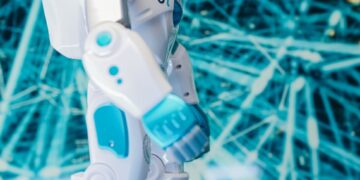The landscape of work is undergoing a seismic shift, propelled by the rapid evolution of artificial intelligence. For years, AI offered glimpses of automation, handling repetitive, rules-based tasks. However, we are now entering an exciting new era where AI’s role extends far beyond mere task execution. Modern AI copilots and intelligent agents are emerging as sophisticated partners, capable of understanding context, anticipating needs, and even acting autonomously on complex projects. This fundamental transformation is not just about making existing processes slightly faster; it is about fundamentally redefining how we approach problem-solving, creativity, and daily operations. Join us as we explore how these advanced AI entities are not just assisting, but actively reshaping productivity and embedding themselves deeply into the fabric of our professional lives, promising an unprecedented era of efficiency and innovation.
The evolution from automation to intelligent partnership
The journey of AI in the workplace began with straightforward automation. Early systems, often rooted in Robotic Process Automation (RPA), excelled at mimicking human clicks and keystrokes to automate highly repetitive, rule-based tasks such as data entry or invoice processing. While undeniably valuable for efficiency, these systems lacked true intelligence; they followed scripts without understanding the underlying context or adapting to unforeseen variables. The true paradigm shift began with the advent of AI copilots. These are not merely automators but interactive assistants designed to augment human capabilities in real-time. They operate like a ‘second brain,’ offering context-aware suggestions, generating content, or debugging code, directly within a user’s workflow. This represents a leap from mere task execution to collaborative problem-solving, where AI acts as a smart companion, enhancing human decision-making and output.
Further pushing the boundaries are AI agents. While copilots assist, agents are designed to *act* autonomously on behalf of a user or system. Given a high-level goal, an AI agent can break it down into sub-tasks, execute them, learn from the outcomes, and even adapt its strategy over time. Imagine an agent tasked with researching market trends: it might scour various databases, synthesize information from multiple sources, generate reports, and even schedule follow-up actions, all with minimal human intervention after the initial directive. This progression from simple automation to intelligent, proactive agents marks a profound change, moving AI from being a tool for individual tasks to becoming a dynamic, strategic partner capable of managing intricate, multi-step projects.
Reshaping creative and knowledge work
One of the most profound impacts of AI copilots and agents is on sectors historically deemed immune to automation: creative and knowledge-intensive industries. These tools are fundamentally altering how professionals approach tasks in writing, graphic design, software development, scientific research, and strategic planning. In creative writing, for instance, a co-pilot can assist authors by generating story ideas, drafting outlines, suggesting stylistic improvements, or even completing sections of text based on a given prompt. This doesn’t replace the author’s creativity but rather accelerates the often-tedious aspects of drafting and refining, allowing more time for conceptualization and artistic direction.
For software developers, AI copilots embedded within integrated development environments (IDEs) can suggest code snippets, identify potential bugs, explain complex code, or even generate entire functions from natural language descriptions. This significantly boosts productivity, reduces debugging time, and helps developers focus on architectural design and innovative solutions. Beyond mere suggestion, AI agents can take on more complex projects, such as generating diverse design mock-ups based on brand guidelines, conducting comprehensive literature reviews for researchers by sifting through vast academic databases, or even synthesizing disparate market data to identify emerging trends for strategic planners. By offloading these time-consuming, cognitive tasks, AI frees human experts to engage in higher-level critical thinking, nuanced decision-making, and truly novel creation.
Redefining operational efficiency and decision-making
Beyond creative realms, AI copilots and agents are revolutionizing operational efficiency and enhancing decision-making across various business functions. In customer service, AI copilots assist human agents by providing real-time information, suggesting responses, or handling routine queries entirely through chatbots. More advanced AI agents can proactively monitor customer sentiment across channels and escalate critical issues before they become major problems. Within supply chain management, AI agents can analyze vast datasets to predict demand fluctuations, optimize inventory levels, and even autonomously re-route shipments in response to unforeseen disruptions like weather events or port congestion.
For data analysts and business leaders, AI copilots transform raw data into actionable insights with unprecedented speed. A co-pilot can generate complex reports, visualize data trends, and even simulate various business scenarios, presenting the implications in an easily digestible format. This dramatically reduces the time spent on data manipulation and increases the time available for strategic interpretation. Furthermore, AI agents can monitor system performance, identify anomalies, and initiate corrective actions in IT operations or manufacturing processes, pre-empting downtime and ensuring continuous operation. The table below illustrates how AI augmentation profoundly changes typical business workflows:
| Task | Traditional Approach | AI Co-pilot/Agent Approach | Productivity Impact |
|---|---|---|---|
| Market Research | Manual data collection, human analysis, lengthy report writing | Agent autonomously gathers data from multiple sources, synthesizes findings, generates summary reports | Time reduced by 70-80%, deeper insights |
| Code Development | Manual coding, debugging, documentation | Co-pilot suggests code, finds errors, generates tests, writes documentation | Development speed increased by 40-50%, higher code quality |
| Customer Support | Human agent handles all queries, searches knowledge base | Co-pilot suggests answers, summarizes past interactions; Agent handles routine queries 24/7 | Resolution time reduced by 30-60%, improved customer satisfaction |
| Strategic Planning | Manual data aggregation, scenario modeling, presentation creation | Co-pilot analyzes trends, simulates outcomes, drafts presentation content | Preparation time reduced by 50-70%, more data-driven decisions |
The symbiotic future of human-AI collaboration
The rise of AI copilots and agents is not about machines replacing humans, but rather about fostering a new, powerful era of human-AI collaboration. This symbiotic relationship posits AI as an intelligent extension of human capabilities, allowing individuals and teams to achieve far more than they could alone. By offloading monotonous, repetitive, or cognitively demanding tasks to AI, human workers are freed to focus on what they do best: applying critical thinking, exercising emotional intelligence, fostering creativity, and engaging in complex problem-solving that requires nuanced judgment and ethical consideration. This shift redefines job roles, elevating the importance of uniquely human skills.
In this future, success hinges on effective collaboration between humans and AI. Users must develop the skill to effectively prompt, guide, and oversee their AI partners, understanding their strengths and limitations. Ethical considerations also become paramount, ensuring AI agents operate within defined boundaries, prioritize fairness, and maintain transparency in their actions. This collaborative model will inevitably lead to the creation of entirely new job categories focused on managing, training, and designing AI systems, further underscoring the idea that AI is a tool for augmentation, not outright replacement. The true power lies in the partnership, enabling us to unlock unprecedented levels of productivity and innovation while allowing humans to concentrate on high-value, uniquely human endeavors.
The journey from basic automation to sophisticated AI copilots and autonomous agents represents a fundamental transformation in how we perceive and execute work. We have moved beyond merely streamlining simple tasks to establishing intelligent partnerships that actively reshape creativity, amplify knowledge work, and dramatically enhance operational efficiency. This evolution is not a superficial upgrade but a deep redefinition of daily workflows, enabling unprecedented productivity gains and fostering a new era of innovation. The ability of AI to understand context, generate sophisticated outputs, and even act autonomously on complex goals is fundamentally altering human capabilities, freeing individuals from the mundane to focus on higher-level strategic thinking, nuanced problem-solving, and truly creative endeavors. The future of work is undeniably collaborative, where human ingenuity, augmented by powerful AI partners, unlocks an era of unparalleled potential and redefines the very essence of human achievement in the digital age.


















